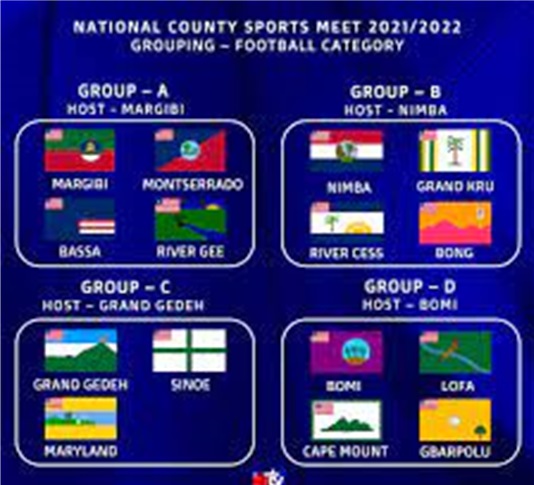The National County Sports Meet in Liberia concluded on February 2nd, 2025, marking the culmination of weeks of intense competition and camaraderie. Grand Bassa County emerged victorious in the girls’ competition, edging out Grand Kru County for the top spot. Lofa County celebrated a double victory, securing championships in both football and basketball. Their football triumph came against Grand Gedeh County in a thrilling final match at the Samuel Kanyon Doe Sports Stadium. While the author’s county, Grand Kru, and his wife’s county, Lofa, experienced contrasting fortunes, the overall sentiment was one of celebration and national unity. The author extended congratulations to all participating teams, emphasizing the importance of sportsmanship and acknowledging that in every competition, there must inevitably be a winner and a runner-up. He commended the Ministry of Youth and Sports and the Liberian government for their successful organization of the peaceful games, recognizing the unifying power of sports and its potential to elevate the nation.
Beyond the immediate results and celebrations, the author reflected on the broader purpose and potential of the National County Sports Meet. He highlighted the commonly stated objectives of scouting new talent and fostering national unity. While expressing gratitude for the achievement of these goals, he also urged the organizers to further leverage the games to strengthen the bonds between Liberians and to identify promising athletes who could represent the country on national and international stages. The author observed the immense popularity of football in Liberia, evidenced by the packed stadium during the final match. He noted the passionate support for different teams, driven by various factors, ultimately culminating in Lofa County’s 2-1 victory.
The author underscored the significance of recognizing and rewarding individual achievements. He congratulated award recipients, encouraging them to continue pursuing their sporting aspirations, while also motivating those who did not receive awards to persevere and strive for future success. He emphasized that the lack of an award in the current competition should not deter them, as future opportunities await. The author’s central message was one of inclusivity and national pride, recognizing the contributions of all participants and their role in representing Liberia.
The author passionately advocated for unity, peace, and reconciliation as the cornerstones of national progress. He believed that these values are essential for achieving sustainable economic growth and development in Liberia. The author firmly supported the notion that the County Sports Meet should serve as a platform to discover and nurture emerging talent, empowering athletes to advance their careers in their chosen disciplines. He envisioned a scenario where the fervent enthusiasm witnessed during the finals could be channeled to support Liberia’s national teams, propelling them to greater heights on the international stage. He championed the idea of leveraging the games to showcase and develop talent across all sporting disciplines, emphasizing national support and the potential for international recognition.
While acknowledging his uncertainty about the specific rules governing participation, the author expressed confidence that the guidelines are designed to benefit young players, competitors, and the national interest of Liberia. He argued for a more localized and grassroots approach to the County Sports Meet, emphasizing the importance of genuine representation and talent identification. He proposed a system where competitions are held at the town, clan, and district levels within each county, culminating in the formation of county teams comprised solely of residents of those counties. This, he believed, would ensure that fresh talent is unearthed and given the opportunity to shine, preventing the recycling of players from established leagues and prioritizing the development of homegrown athletes.
The author envisioned a decentralized competition structure that would uncover hidden talent within each county. He stressed the importance of avoiding the practice of recruiting players from outside the county, arguing that it undermines the principle of local representation and talent development. He called for government funding to support this localized approach, believing that it would enhance the effectiveness of the County Sports Meet in achieving its objectives of fostering unity, identifying new talent, and elevating the competition to a higher level. He concluded that by prioritizing local talent and ensuring genuine representation, the government could fully realize the transformative potential of the National County Sports Meet.
The author, Professor Tom Kaydor Jr., brings a wealth of academic and professional experience to his commentary on the National County Sports Meet. As an Assistant Professor at the IBB Graduate School of International Studies, he holds a PhD in International Development and Diplomacy with a focus on security aspects. His dissertation explored reconceptualizing Africa’s regional integration for peace and sustainable development. His academic background includes a Master of Public Policy specializing in Development Economics, a Master of Arts in International Relations, and a Bachelor of Arts in Political Science. He has also completed various professional diplomas and certificates from institutions around the world, including Harvard University, the Islamabad Foreign Service Academy, and programs in Italy, the UK, China, and Israel. Professor Kaydor’s extensive experience includes roles as Deputy Foreign Minister for International Cooperation and Economic Integration in Liberia, Assistant Foreign Minister for Afro-Asian Affairs, and various positions with the United Nations and other international organizations. He is a published author, a columnist, and a reviewer for several international journals, lending further weight to his analysis of the National County Sports Meet and its implications for Liberia’s future.














